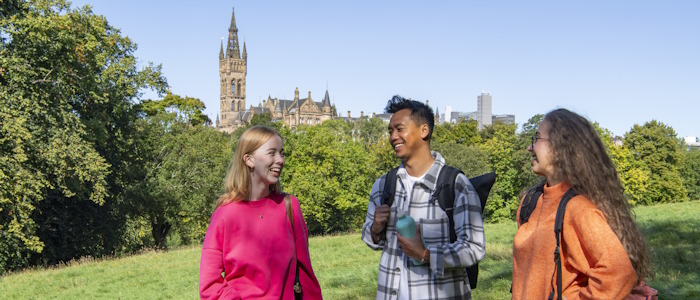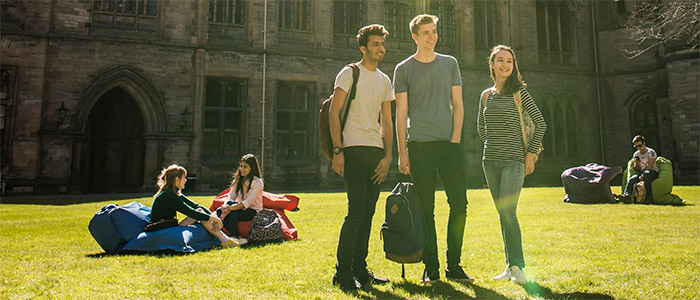Philosophy MA/BSc/MA(SocSci)

Philosophy is the systematic attempt to arrive at clear answers to profound questions about issues such as knowledge, life, morality, science and human nature using reason and argument.
We host reading parties for students, usually in the Highlands, and have a flourishing undergraduate Philosophy Society.
- September start
- Session dates
- Philosophy MA (Hons): V502 4 year degree
- Glasgow: Gilmorehill campus
- Degree options
- Study abroad available
Programme structure
Year 1
You will study two courses, which will introduce you to a range of philosophical tools and ideas by thinking through a series of philosophical questions.
- How should I think? This course introduces students to the practice of thinking philosophically, by encouraging the development of critical reasoning skills and exploring issues pertaining to the nature and acquisition of knowledge. Students will apply their critical skills to practical issues of current interest and importance.
- How should I live? This course further develops critical thinking skills by considering topics in ethics such as the question of what makes actions right and wrong, questions in political philosophy concerning how we should live together, and fundamental questions concerning the meaning of life and death.
Year 2
You will study two more courses, continuing to build your knowledge of the basic philosophical toolkit by exploring further philosophical questions.
- What am I? This course introduces students to core philosophical issues concerning the nature of the self. Students will explore the relationship between mind and body, what constitutes sameness of self over time, whether and in what sense the self is free, and how the self is related to the world in which it is located. .
- What is there? This course introduces students to core philosophical issues concerning the nature of reality. Students will explore core questions in formal logic, metaphysics, philosophy of religion, and philosophy of science, focusing on the questions of what kinds of things can be said to exist.
By the end of your second year you will have experience of most core areas of philosophy, as well as having practical know-how about how to draw on those areas to develop your own answers to the questions we explore in years 1 and 2.
You will also study other subjects in years 1 and 2: see Flexible degrees.
Years 3 and 4
If you progress to Honours (years 3 and 4) you will choose courses giving you an in-depth knowledge of core areas like epistemology, metaphysics, formal logic, moral philosophy, philosophy of mind, and political philosophy.
You will also take high-level specialist courses linked to the active research of lecturers and researchers in the subject.
In year 4 you will have the opportunity to write a dissertation, working one-to-one with a member of staff on a topic of your choice.
Course details
Programme alteration or discontinuation
The University of Glasgow endeavours to run all programmes as advertised. In exceptional
circumstances, however, the University may withdraw or alter a programme. For more information,
please see: Student contract.
Our international links
We encourage our students to study abroad (usually during year 3). We have an exchange scheme with the University of Barcelona and our Philosophy students have also studied in the United States, Canada, Australia, New Zealand, Hong Kong, Denmark and Finland. See Study abroad.
Entry requirements
for entry in 2025
You should refer to the entry requirements for both subjects and the degree award when applying for a joint honours degree programme. The higher entry requirement (where applicable) and additional requirements must be met for both subjects.
Summary of entry requirements for Philosophy
SQA Higher entry requirements
- BBBB is the minimum requirement from S5 to be reviewed for an S6 offer
- Offers are not guaranteed to applicants who meet the minimum from S5
- Typically offers will be made at AAAAA by end of S6. B at Advanced Higher is equivalent to A at Higher
- Additional requirements: Higher English and a Higher Humanities subject at AA (AB may be considered).
SQA Higher adjusted entry requirements* (by end of S5 or S6)
- MD20: BBBB (also other target groups*)
- MD40: AABB*
- Additional requirements: Additional requirements: Higher English and a Higher Humanities subject. Successful completion of Top-Up or one of our Summer Schools.
* See Access Glasgow for eligibility.
A-level standard entry requirements
- AAB – BBB
- Additional requirements: one A-level Humanities subject.
IB standard entry requirements
- 34 (6,5,5)
- Additional requirements: English HL6 or Humanities HL6 with English SL6.
Entry requirements for advanced entry to Philosophy
Applicants who achieve exceptional grades in their Advanced Highers, A-levels or International Baccalaureate may be considered for advanced entry, meaning that an Honours degree can be completed in three years instead of the normal four years, or four years for five-year integrated Masters programmes. Not all joint honours subjects are available for advanced entry and applications to joint honours programmes will be considered on a case-by-case basis.
Choose point of entry 2nd year on your UCAS application to indicate you wish to be considered for advanced entry.
SQA Higher requirements for advanced entry
- Three Advanced Highers at Grades AAA attained in one exam year and at the first attempt. Subjects must be relevant to the courses to be taken at Level 2.
A-Level requirements for advanced entry
- A*A*A
IB requirements for advanced entry
- 38 points
Admissions guidance
English language
For applicants from non-English speaking countries, as defined by the UK Government, the University sets a minimum English Language proficiency level.
English language requirements
Career prospects
You will develop transferable skills and attributes which will be valuable in your future career. These include the ability to evaluate arguments and interpret texts, the facility to be analytical, the skill to think and write clearly and precisely, and the capacity to question assumptions.
Some of our graduates go on to study for postgraduate degrees in Philosophy and to teach in universities. Examples of recent destinations for Philosophy graduates include:
- Hydrogen Group (recruitment consultant)
- Hopscotch Films (TV researcher)
- The Guardian (audience editor)
- Civil Service fast track (Treasury and MoD).
Degrees and UCAS codes
When applying you will need to know the UCAS code for the subject or subject-combination that you wish to apply to:
MA (Hons)
BSc (Hons)
MA(SocSci) (Hons)
Philosophy can also be taken in combination with Law programmes:
Fees and funding
Tuition fees
How and when you pay tuition fees depends on where you’re from: see Tuition fees for details.
Scholarships
The University is committed to supporting students and rewarding academic excellence. That's why we've invested more than £1m in additional scholarship funding in recent years.
World Changers Global Excellence Scholarship
World Changers Glasgow Scholarship UG (EU)
World Changers RUK Excellence Scholarship
World Changers RUK Access Bursary
James McCune Smith Undergraduate Scholarship
Care Experienced and Estranged Student Bursary
Beaconhouse Schools
Undergraduate Talent Scholarships
Cowrie Foundation Scholarship
The Clan Gregor Society Prize
The Dima Alhaj Scholarship
Sanctuary Scholarships
Travel Bursary for Forced Migrants
Glasgow Highland Society Scholarship
The scholarships above are relevant to this programme. For more funding opportunities search the scholarships database
How to apply
Full-time students must apply through the Universities & Colleges Admissions Service (UCAS).
SQA applicants who are eligible for our Widening Participation programmes are encouraged to participate in one or more of these programmes, including Summer School, to support your application and the transition to higher education.
International students to Arts, Engineering, Law, Nursing, Science, and Social Sciences can also apply using The Common Application: however, if applying to more than one UK university, we recommend using UCAS. Applications to Dentistry, Education, Medicine, and Veterinary Medicine must be made through UCAS.
Application deadlines
- 15 October: if including Dentistry, Medicine, Veterinary Medicine or also applying to Oxford or Cambridge
- 29 January: all other UK applicants (unless otherwise stated on the UCAS website)
- 30 June: international students.
We do not usually accept any applications after these deadlines.
It's your responsibility to ensure the accuracy of your application before submission. Requests to correct application content, change degree programme or change college of entry, will not be accepted after these deadlines. This policy is in place to ensure fairness and consistency to all applicants, and no exceptions will be made.
- Apply at www.ucas.com or through your school or college
- Contact UCAS on 0871 468 0468
- Apply at commonapp.org (international students to certain areas only)
How to apply for Advanced Entry
Apply for year 2 (Y2) on your UCAS application. If the specific subject is unavailable for Advanced Entry or your application for year 2 entry is unsuccessful, you will be automatically considered for year 1 entry. You do not have to submit a separate UCAS application.





